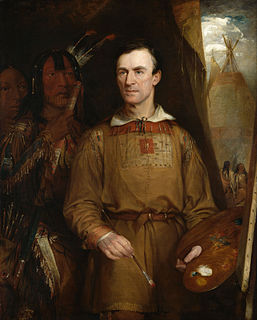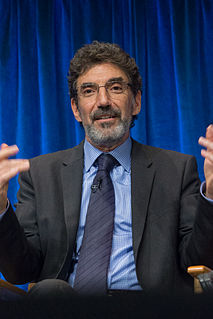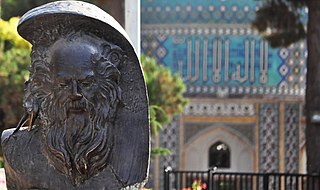A Quote by Cormac McCarthy
Each leaf that brushed his face deepened his sadness and dread. Each leaf he passed he'd never pass again. They rode over his face like veils, already some yellow, their veins like slender bones where the sun shone through them. He had resolved himself to ride on for he could not turn back and the world that day was as lovely as any day that ever was and he was riding to his death.
Related Quotes
The face of the Son of God, who, instead of accepting the sacrifice of one of his creatures to satisfy his justice or support his dignity, gave himself utterly unto them, and therein to the Father by doing his lovely will; who suffered unto the death, not that men might not suffer, but that their suffering might be like his, and lead them up to his perfection.
'Ever seen a leaf - a leaf from a tree?' 'Yes.' I saw one recently - a yellow one, a little green, wilted at the edges. Blown by the wind. When I was a little boy, I used to shut my eyes in winter and imagine a green leaf, with veins on it, and the sun shining ...' 'What's this - an allegory?' "No; why? Not an allegory - a leaf, just a leaf. A leaf is good. Everything's good.'
I turned around slowly, and looked up at him. He stiffened and sucked in a shallow breath. After a moment, he touched my cheek. "Such naked pain," he whispered. I turned my face into his palm and closed my eyes. His fingers threaded into my hair, cupped my head, and brushed the brand. It heated at his touch. His hand tightened at the base of my skull and squeezed, and he raised me slowly to my tiptoes. I opened my eyes and it was my turn to inhale sharply. Not human. Oh, no, not this man. "Never show it to me again." His face was cold, hard, his voice colder.
I'm thinking of writing a children's story about a leaf on a tree who arrogantly insists he's a self-made, independent leaf. Then one day a fierce wind blows him off his branch and to the ground below. As his life slowly ebbs away, he looks up at the magnificent old tree that had been his home and realizes that he had never been on his own. His entire life he had been part of something bigger and more beautiful than anything he could have imagined. In a blinding flash, he awakens from the delusion of self. Then an arrogant, self-centered kid rakes him up and bags him.
And even if these scenes from our youth were given back to us we would hardly know what to do. The tender, secret influence that passed from them into us could not rise again. We might be amongst them and move in them; we might remember and love them and be stirred by the sight of them. But it would be like gazing at the photograph of a dead comrade; those are his features, it is his face, and the days we spent together take on a mournful life in the memory; but the man himself it is not.
What sort of man is this, who over and over again, gave numerous details about His death, months before it occurred, and added to each such utterance that on the third day after His decease He would rise again from the dead - and DID RISE, as even the city of Jerusalem soon came to believe? No other founder of a great world religion (or a small one) ever made such statements, or ever came forth from the dead.
Surely there had been no figure leaning on the back of his chair; no face looking over it. It is certain that no gliding footstep touched the floor, as he lifted up his head, with a start, and spoke. And yet there was no mirror in the room on whose surface his own form could have cast its shadow for a moment; and, Something had passed darkly and gone!
Branches grew from his hands, his hair. His thoughts tangled like roots in the ground. He strained upward. Pitch ran like tears down his back. His name formed his core; ring upon ring of silence built around it. His face rose high above the forests. Gripped to earth, bending to the wind's fury, he disappeared within himself, behind the hard, wind-scrolled shield of his experiences.
A thousand for his love expired each day, And those who saw his face, in blank dismay Would rave and grieve and mourn their lives away- To die for love of that bewitching sight Was worth a hundred lives without his light. None could survive his absence patiently, None could endure this king's proximity- How strange it was that man could neither brook The presence nor the absence of his look!
Socrates was the chief saint of the Stoics throughout their history ; his attitude at the time of his trial, his refusal to escape, his calmness in the face of death , and his contention that the perpetrator of injustice injures himself more than his victim, all fitted in perfectly with Stoic teaching. So did his indifference to heat and cold, his plainness in matters of food and dress, and his complete independence of all bodily comforts.
She had taken him for granted, she thought with surprise and shame, watching the flickering candlelight. She had assumed his kindness was so natural and so innate, she had never asked herself whether it cost him any effort. Any effort to stand between Will and the world, protecting each of them from the other. Any effort to accept the loss of his family with equanimity. Any effort to remain cheerful and calm in the face of his own dying.






































